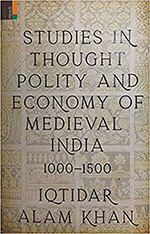The book is a collection of essays on varied themes comprising the concept of India in Alberuni, Hindu chiefs in Sultanate polity, economic theories during the period, economic implications of political disintegration and Shaikh Abdul Quddus Gangohi’s relations with political authorities. Even as these essays focus on the study of thought, polity and economy, they investigate the history of India during the period 1000-1500 CE with particular reference to the Delhi Sultanate. It relates valuable paradigms of the period that gave the Delhi Sultanate a different character notwithstanding its Islamic identity. The Sultans of Delhi, despite their expertise in military strategies and horsemanship, shared power with the local Kshatriya rulers, incorporated Hindu chiefs into administration including the rural magnates and technical personnel. Amongst the rural officials, the most prominent were the patwaris, with merit and excellence in agricultural processes. In other words, the ruling elite during this period comprised not merely the Turkish chiefs or the Sultans of Delhi but significantly the local Hindu chieftains, recruited as naiks. The naiks were a body of large and ethnically diverse group of officials of the Sultan, instrumental in achieving rapid territorial expansion of the Sultanate. To control these officials and achieve centralization, as Iqtidar Alam Khan suggests, the Sultans assigned them iqta (land revenue assignment) so that they could get their share from the surplus. However, contrary to the suggestion of the author, this system did not result in centralization but decentralization and ultimately disintegration.
More importantly, though the state structure of the Delhi Sultanate evolved under the influence of Sassanid and Turkish traditions, inherited from the Ghaznavid and the Ghorid, it was, in fact, the local, Hindu cultural values that determined its character.

